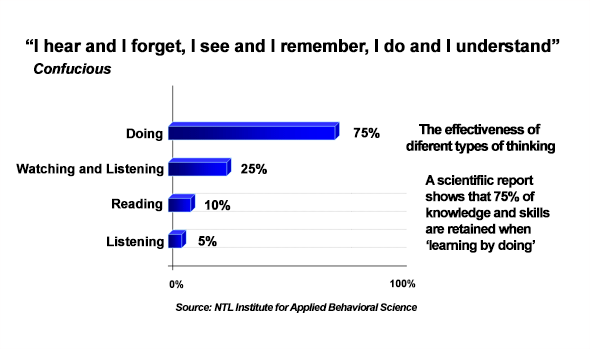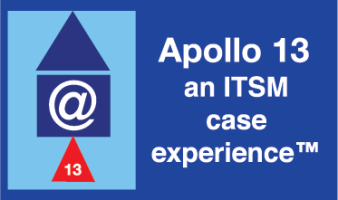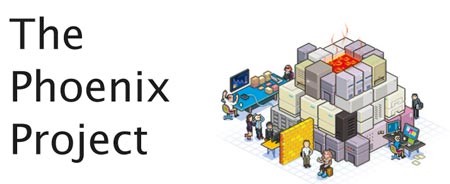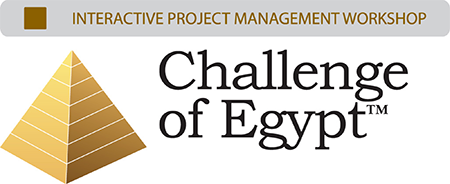The definition of knowledge:
Expertise and skills acquired through
experience or education;
the
practical or theoretical
understanding of a subject.
We have an extensive portfolio of Best practice courses which deliver certification in ITIL®, PRINCE2®, RESILIA™, these address the ‘education’ and ‘ theory’ aspects of knowledge development.
This portfolio is supplemented with a range of business simulation games or ‘experiential learning instruments’ in which delegates gain more ‘hands-on’, practical skills in applying the knowledge.
A scientific study shows the effects of this type of learning and how this increases the retention of knowledge and skills gained through training, helping to maximise the Return on Value (ROV) from a training investment.


The mission of your team is clear:
Launch a rocket with the MarsLander on board, bring it to Mars and collect valuable data for Universities and Research Centers.
Your challenge is to support the Mission Center, helping ensure they are able to achieve all mission goals. The Mission Director is managing the Mission Center and leads a team consisting of Flight Operation, Navigation and communication experts. These specialists manage the flight plan of the mission in accordance with mission goals and contractual agreements with the customers and suppliers.
The Mission Support Team consists of Support Engineers, Test Engineers and Change Management. They will resolve all issues that occur during the mission. The Development Team develops and maintains applications, features and application fixes. Vendors are supporting the Mission Support Team with data communication services and data storage services. The Service Manager will manage the Service Design, Service Delivery and Service Improvement.
This simulation is about exploring and experiencing how you can transform your current IT organization into a more Agile and Lean organization. The following aspects will be experienced and discussed:

You are the Mission Control Center of NASA. Your aim is to support the Crew during the Mission. You must design your services, implement them, execute them and apply continual improvement practices in order to ensure mission success. In 4 rounds you will be challenged with events, problems, issues, changes and increasing business demand. You must apply the ITSM best practices in order to become successful. You will guide the crew through the launch, journey to and from the moon, to a safe return and splashdown, at the same time realizing the strategic goals for the mission.
The learning objectives are dependent upon what your organization is trying to achieve, where you are on your ITSM journey and the problems and issues you are trying to solve. These are some of the objectives achieved during this training:

Businesses are demanding ever shorter release cycles for new applications. Traditionally ‘Operations’ is seen as a barrier with lengthy bureaucratic controls and delays in provisioning production systems. DevOps is a growing movement for shortening development and deployment and integrating Development and Operations. However this requires a mind-set shift, new behaviours and a cultural shift in both Development and Operations. Traditionally suspicious of each other, they must now work closely together.
The simulation game is based upon ‘The Phoenix Project’ Book. Parts Unlimited is in trouble. Newspaper reports reveal the poor financial performance of the organization. The only way forward to not only save the company but to make it competitive and profitable is “The Phoenix Project” which represents an IT enabled business transformation, with Retail Operations as the business owner of this project. The VP of IT Operations is asked to take the lead of the IT department and ensure that “The Phoenix Project” will be a success. But the VP of IT Operations is facing a tremendous amount of work. A huge backlogs of issues, features and projects.
Your team will act in different roles within the Parts Unlimited organization. You can be Retail Operations, Human Resources or Finance – playing the Business roles of the company. Or you can be the VP of IT Operations or other members from his IT Team that needs to develop the applications and solve the IT Issues.
Your challenge is to use the DevOps principles and apply them in this serious Business Simulation. In three rounds you will work on the IT projects and IT issues and ensure that “The Phoenix Project” will be finished on time. But, beware, the business keeps coming with new ideas and demands and external developments outside your control can also throw a spanner in the works.
The simulation will be customized towards your own specific needs and learning objectives. But in general these are the main objectives:

The owner of a Tokyo Bank has decided to organize an exhibition of 3 very famous and attractive objects in the Tokyo Museum. A criminal team called Oceans99 has plans to steal the objects. The team consisting of museum owners, a transport manager, a security advisor and a project manager is responsible for realizing this project. The team has to develop an information security policy, security plans, perform a risk analysis to identify threats, implement measures and execute the project. The team will transport the objects from the museums to the Tokyo Museum, but Oceans99 is not to be underestimated. After each round the team will receive feedback as to how well they protected the objects and will have time to improve. Will the Sponsor (the Tokyo bank) realize a Return on Investment or will the exhibition become a drama.
Each of the simulations will be customized towards your own objectives. But in general these are the main objectives:

Grab@Pizza is a very successful company selling millions of Pizza’s every year. But after 6 months in the current year, the sales figures are far below expectations. The CEO urged the Business Manager to make a challenging recovery plan. This plan is based on a 6 month strategy to bring the sales and profit back on target. IT is a crucial enabler for reaching new markets, streamlining processes and reducing administrative overheads. The IT department must organize themselves to explore the business demands, translate them to IT strategy and organize IT Support, IT Operations, Change Management to make ensure that the Business is successful at the end of the simulation.
Each of the simulations will be customized towards your own organizational learning objectives and problems to be solved. However in general these are the primary objectives:

We are in ancient Egypt. The Pharaoh asked the leader of the steering group to build a Pyramid to secure his journey to the afterworld. This being essential for his eternal existence. The steering group assigns a Project Leader and a project team to execute the project. The team has to deal with all kinds of events and setbacks to keep the project within Scope, Quality, Budget and Time. This requires managing work packages, managing risks, managing tolerances and all those other best practice project management processes and procedures. But be prepared. The Pharaoh comes with other issues and has other ideas which may impact the project.
The simulation will be customized towards your own specific needs and learning objectives. But in general these are the main objectives: